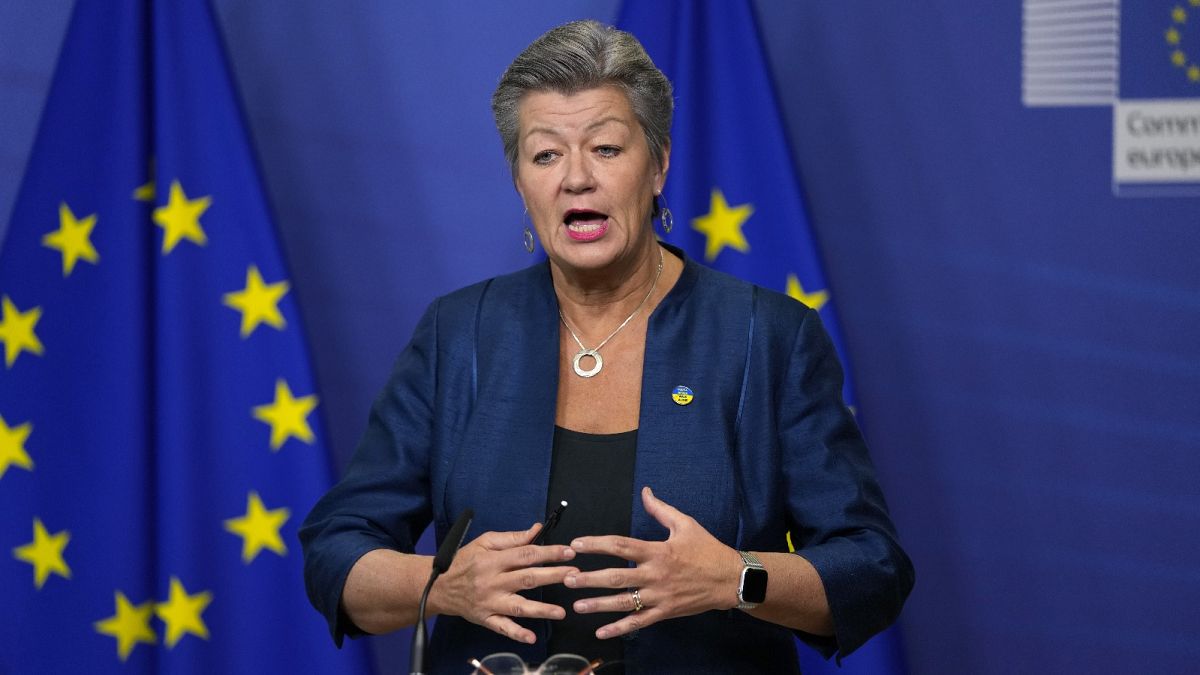A sharp democratic backsliding has been observed in Tunisia since a 2019 power grab by President Kais Saied.
The European Union "needs to work" with Tunisia to stem the flow of irregular migrant arrivals but will continue to criticise the government when necessary, Ylva Johansson said on Wednesday.
The bloc announced on Sunday that it will provide €100 million to Tunisia this year for border management, search and rescue, anti-smuggling and return and that it stands ready to provide a further €1 billion of macro-financial assistance if the country follows through with some reforms.
The announcement, made during a visit to Tunisia by Commission chief Ursula von der Leyen, Italian Premier Giorgia Meloni and Dutch Prime Minister Mark Rutte, was however denounced as "blackmail" by the Tunisian Forum for Economic and Social Rights, a local NGO.
Tunisian President Kais Saied is accused of having orchestrated a power grab and democratic backsliding that has further exacerbated a difficult financial situation that forced the country to call on the International Monetary Fund for assistance.
He has also been lambasted for stoking racist sentiment and anti-immigrant violence.
'We have to work with them'
Asked by Euronews whether the EU could trust Tunisian authorities to respect migrants' human rights, Ylva Commission, the Commissioner for Home Affairs said: "It's not black or white."
"There are points that we have been criticising and will probably continue to criticise not only in Tunisia but also in other partner countries. But at the same time, we have to work with them.
"So this is not a black-or-white situation. We have to do the best out of the situation but that, of course, means that in some instances, we also need to criticise," she said.
She described the €100 million deal with Tunis as "a good example of a comprehensive approach towards migration".
"We will work together to fight the smugglers, to protect the borders, to make sure that those that are in Tunisia and would like to leave and go back to their countries of origin can do so voluntarily with support for reintegration, that we will invest in legal pathways and that the Tunisians agree that Tunisian citizens should be returned back and reintegrated into the society," she told Euronews.
About 330,000 irregular border crossings were detected at the bloc's external border last year, a 64% increase compared to the previous year and the highest tally since 2016.
The number of asylum applications lodged in the EU was also the highest since 2016 at 962,000.
'Our migration policy is not working well today'
The soaring figures provided the impetus for member states to finally, after seven years of protracted discussions, reach an agreement last week to revamp the EU's migration and asylum policy.
The deal, which was passed by qualified majority and which still needs to be negotiated with the European Parliament, concerns two main pillars of the so-called New Pact on Migration and Asylum: a system of mandatory solidarity to manage the arrival of asylum seekers and a common framework to streamline border procedures.
Only two member states — Hungary and Poland — opposed the agreement which would see countries choose to either accept a number of relocated asylum-seekers, pay for the return of rejected applicants to their country of origin or finance operational support such as infrastructure and personnel.
But Johansson insisted that "all member states have to comply with the regulation" and said that the EU's executive will also "set up a special implementing task force" to ensure it is properly rolled out.
"And of course, it's the role of the commission to make sure that all member states comply with the EU law," she added.
She also said that she is "extremely optimistic" the co-legislators will be able to conclude talks and pass the regulation before the end of the Commission's mandate, in mid-2024.
Her interview with Euronews came just hours after dozens of migrants were reported dead after their small fishing boat capsized and sank off the southern coast of Greece.
"I think that this is a sign of why our migration policy is not working well today," she said.
The New Pact, she added, "will actually help break the business model of the smugglers" and also "help the legal pathways and the humane reception of those that apply for asylum".
